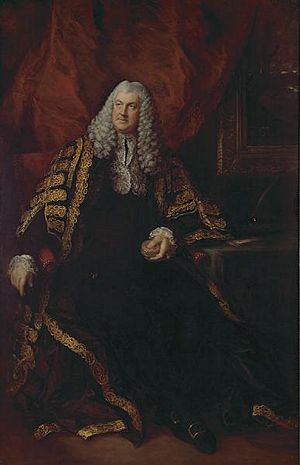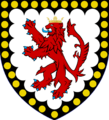Charles Wolfran Cornwall facts for kids
Quick facts for kids
Charles Wolfran Cornwall
|
|
|---|---|

Portrait by Thomas Gainsborough
|
|
| Speaker of the House of Commons of Great Britain |
|
| In office 31 October 1780 – 2 January 1789 |
|
| Monarch | George III |
| Preceded by | Fletcher Norton |
| Succeeded by | William Grenville |
| Personal details | |
| Born | 15 June 1735 Winchester |
| Died | January 2, 1789 (aged 53) London |
| Nationality | British |
| Spouse | Elizabeth Jenkinson |
| Alma mater | New College, Oxford |
Charles Wolfran Cornwall (born June 15, 1735 – died January 2, 1789) was an important British politician. He was a member of the House of Commons from 1768 until his death in 1789. He also served as the Speaker of the House of Commons for nine years, from 1780 to 1789.
Contents
Early Life and Education
Charles Wolfran Cornwall was born in Winchester on June 15, 1735. His father was Jacobs Cornwall, and his mother was Elizabeth Forder. Sadly, his father passed away when Charles was very young, in 1736.
Even though some of his family members were involved in the navy, Charles was prepared for a career in law. He started his education at Winchester College in 1748. Later, he went to New College, Oxford, and then began studying law at Lincoln's Inn in 1755. He officially became a lawyer in 1757.
In 1756, Charles inherited a lot of money and land from his uncle, Sir Robert de Cornwall, who had no children. This inheritance meant he didn't have to work much as a lawyer. Instead, he decided to focus on a career in politics.
Starting a Political Career
Charles Cornwall's journey into politics was helped by his connection to his cousin, Charles Jenkinson. This connection became even stronger when Charles married Jenkinson's sister, Elizabeth, in 1764.
In 1763, Charles wanted to become a Member of Parliament (MP). However, he first took a job as a Commissioner. In this role, he helped examine government accounts from 1763 to 1765. This job taught him a lot about how the Treasury (the government's money department) worked.
After this job, Charles started to disagree with his cousin Jenkinson on political matters. He began to spend time with other political groups, like those led by the Marquess of Rockingham and the Earl of Shelburne. The Earl of Shelburne helped Charles achieve his goal of becoming an MP. Charles was elected to represent Grampound in the 1768 election.
As an MP, Charles often spoke out against the government. He was especially interested in issues concerning the East Indies (parts of Asia). In 1773, he was offered a job in Bengal to oversee the East India Company, but he turned it down.
Joining the Government
Unlike many of his colleagues in the Opposition (the group that opposes the government), Charles supported the government's actions regarding the American Revolution. He believed that Britain, as the "mother country," should not simply do whatever America demanded.
Because of his support for the government, and with the offer of a yearly payment of £500 (which was a lot of money then) and a position on the Treasury Board, Charles decided to join the government side in 1774. This move is sometimes called "crossing the floor."
In the 1774 election, he was elected to represent Winchelsea. This was a "rotten borough", meaning it was a small town with very few voters, and the government often controlled who was elected there. He represented Winchelsea for ten years before moving to another nearby government-controlled area called Rye.
In 1775, Charles sold his family estate at Berrington. This estate had been in his family for ten generations. The new owner, Thomas Harley, later had a famous architect, Henry Holland, rebuild the house, and its gardens were redesigned by Capability Brown.
In 1780, Charles was given another job called Justice in Eyre north of the Trent. This was a "sinecure", meaning it was a job that paid £100 a year but required very little work.
Becoming Speaker of the House
The previous Speaker, Fletcher Norton, had upset King George III. So, when a new parliament began in 1780, the government wanted a new Speaker. They suggested Charles Cornwall for the role. He was elected Speaker on October 31, 1780. The King was pleased, calling him "a very respectable person for the office of Speaker." Soon after, Charles became a member of the Privy Council, a group of important advisors to the King.
While leading debates in the House, Charles Cornwall had an unusual habit. He would sometimes drink porter (a type of dark beer) that was brought to him from a nearby refreshment house. This helped him get through long and sometimes boring debates.
On February 27, 1786, Charles Cornwall made an important decision. The votes on a government plan to build forts at Portsmouth and Plymouth were tied, with 169 members for and 169 against. As Speaker, he had the power to cast a deciding vote, known as a casting vote. He voted against the government's proposal, which meant it was defeated. This was an early example of what later became known as Speaker Denison's rule, where the Speaker usually votes to allow further debate or to maintain the status quo.
People described Charles Cornwall as having a strong voice, an impressive appearance, and a commanding presence, which were good qualities for a Speaker. He was known for his frequent and well-informed comments from the Speaker's chair. He would call out MPs for bad behavior and made important decisions on how parliamentary procedures should work. For example, he allowed the new idea of parliamentary questions in May 1783, where MPs could directly ask questions to government ministers.
During breaks from Parliament, he lived at the Master's House of the Hospital of St Cross near Winchester, as his own house was too small for a Speaker's staff.
Death
Charles Cornwall was the first Speaker of the House of Commons to die while still in office. He was in the Speaker's chair for the last time on December 29, 1788. He then became ill with a "feverish cold." He was absent from the House for two days, expecting to return soon. However, on January 2, 1789, the House was informed that Mr. Speaker had passed away that morning.
He was buried in the chapel of the Hospital of St Cross, and a monument was created for him by the sculptor John Francis Moore. Since Charles and his wife had no children, most of his estate was left to his wife for her lifetime. After her death, it was passed on to the children of his distant cousin, Sir George Cornewall.
Images for kids
 | Anna J. Cooper |
 | Mary McLeod Bethune |
 | Lillie Mae Bradford |


